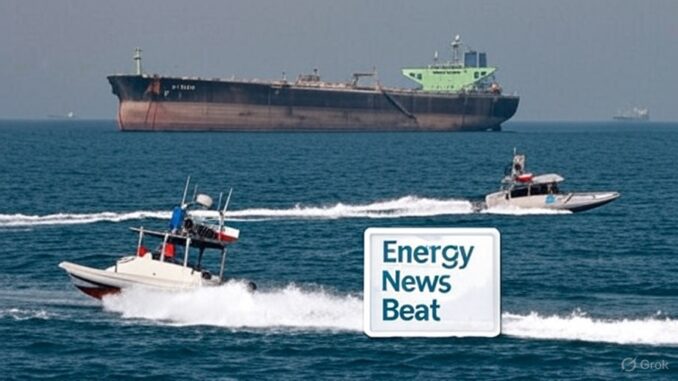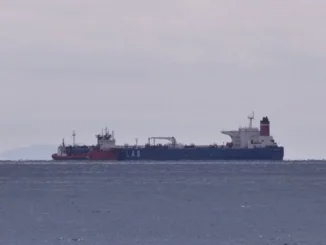
The U.S. Treasury Department has announced a fresh wave of sanctions targeting Iran’s illicit oil trade, specifically focusing on its elusive “dark fleet” network, a shadowy system of vessels and operators that smuggle Iranian oil to evade international restrictions. This move, part of the ongoing U.S. “maximum pressure” campaign, aims to choke off the financial lifelines that fund Iran’s Islamic Revolutionary Guard Corps (IRGC) and its destabilizing activities across the Middle East. But how effective are these sanctions, and what makes this latest effort different? Let’s dive into the details.
Is Oil & Gas Right for Your Portfolio?
The Dark Fleet: Iran’s Oil Smuggling Playbook
Iran’s dark fleet, often referred to as a “shadow fleet,” is a sophisticated network of tankers, operators, and intermediaries that transport billions of dollars’ worth of Iranian crude and petroleum products to global markets, primarily China. According to the U.S. Treasury, this network relies on tactics like blending Iranian oil with Iraqi crude, forging documentation, and conducting ship-to-ship transfers to obscure the oil’s origins. A key figure in the latest sanctions is Iraqi-British businessman Salim Ahmed Said, whose UAE-based company, VS Tankers (formerly Al-Iraqia Shipping Services & Oil Trading), has allegedly smuggled Iranian oil since 2020, generating billions in revenue for Tehran.
The Treasury also targeted several vessels, including the Cameroon-flagged Vizuri, Comoros-flagged Fotis, and Panama-flagged Themis and Bianca Joysel, accusing them of covertly delivering Iranian oil. These ships, along with others, engage in practices like “spoofing” — broadcasting fake route information to mask their activities — and transferring oil to non-sanctioned vessels for delivery to buyers in Asia, particularly China.
How Sanctions Work (or Don’t)Sanctions are designed to freeze the assets of targeted entities, bar U.S. citizens from dealing with them, and expose foreign firms to secondary sanctions, effectively raising the cost of doing business with Iran. The U.S. has imposed multiple rounds of sanctions on Iran’s oil trade since 2021, with this latest action marking the tenth round since February 2025. The Treasury’s Office of Foreign Assets Control (OFAC) uses Executive Orders like 13846 and 13224 to target Iran’s petroleum sector and counterterrorism efforts, aiming to disrupt the financial networks that support the IRGC and groups like Hezbollah.
But how effective are these measures? Historically, sanctions on Iran’s oil trade have had mixed results. Data from Kpler, cited by Bloomberg, shows that Iran exported nearly 1.4 million barrels per day of crude to Chinese ports in the first half of 2025, generating about $1 billion in revenue in June alone. This suggests that, despite U.S. efforts, Iran’s oil continues to flow freely, largely through China’s “teapot” refineries, which buy discounted crude via shadow supply chains.
Analysts estimate that a significant portion of U.S. sanctions fail to curb Iran’s oil exports due to several factors:
- Evasion Tactics: Iran’s use of ship-to-ship transfers, falsified documentation, and dark pool tankers (vessels that turn off their transponders) makes tracking and enforcement difficult.
- China’s Role: As the largest buyer of Iranian oil (consuming nearly 90% of its exports), China’s independent refineries operate outside the U.S. dollar-dominated financial system, using renminbi and small, sanctioned banks to shield transactions.
- Global Demand: High demand for discounted oil, especially in Asia, incentivizes buyers to skirt sanctions, undermining U.S. efforts
While exact numbers on “ineffective” sanctions are hard to pin down, reports suggest that since 2018, when the U.S. reimposed sanctions under the Trump administration, Iran’s oil exports have remained resilient, dropping only temporarily before recovering through adaptive smuggling networks. A 2021 Bloomberg report noted that Iran’s oil sector has largely weathered U.S. sanctions, with its energy industry emerging “unscathed” from recent U.S.-Israeli strikes.
Can These New Sanctions Make a Difference?
The latest sanctions aim to address some of these challenges by targeting specific nodes in the smuggling network, such as Said’s companies and vessels known to transport Iranian oil. Here’s how they might work:
- Asset Freezes and Transaction Bans: By designating entities like VS Tankers and vessels like Vizuri, the U.S. can freeze their U.S.-linked assets and prohibit Americans from engaging with them. This increases the financial risk for operators and may deter some buyers.
- Secondary Sanctions: Foreign firms facilitating Iran’s oil trade face the threat of secondary sanctions, which could cut them off from the U.S. financial system. This pressures intermediaries in places like the UAE and Malaysia to reconsider their involvement.
- Disrupting Key Players: Targeting individuals like Salim Ahmed Said, who allegedly bribed Iraqi officials to blend Iranian oil with Iraqi crude, could disrupt critical links in the smuggling chain.
- Vessel Tracking and Exposure: By publicly identifying shadow fleet vessels, the U.S. makes it harder for them to operate undetected, as ports and insurers may flag them for scrutiny.
However, challenges remain. Iran’s ability to adapt, coupled with China’s willingness to buy its oil, limits the sanctions’ impact. President Trump’s recent comments suggesting that China is free to purchase Iranian oil further complicate enforcement, signaling a selective tolerance that may undermine the Treasury’s efforts. Additionally, Iran’s suspension of cooperation with the UN’s nuclear watchdog and its continued oil exports suggest that the regime remains defiant.
The Bigger Picture
The U.S. sanctions on Iran’s dark fleet are a high-stakes chess move in a broader geopolitical game. While they aim to starve Tehran of revenue used to fund the IRGC and proxies like Hezbollah, their success hinges on international cooperation and enforcement, areas where gaps persist. For now, Iran’s shadow fleet continues to navigate the global oil market, exploiting loopholes and leveraging allies like China to maintain the flow of petrodollars.
As the Energy News Beat team will continue to monitor, the effectiveness of these sanctions will depend on whether the U.S. can close the enforcement gaps and convince global players to prioritize compliance over cheap oil. Until then, Iran’s dark fleet remains a slippery target, and the world watches to see if these measures will finally tip the scales. As Irina Slav, Energy Writer, says, “Sanctions don’t work as intended.” And they were not enforced under the Biden Administration. And I am a little confused, as President Trump was encouraging China to buy more Iranian oil, as well as U.S. oil. They have not, but our Beutaine sales have started again. We will verify and update this story.
Sources: OilPrice.com, U.S. Treasury Department, Bloomberg, Reuters





